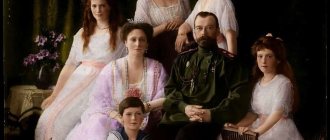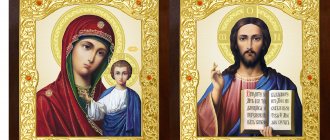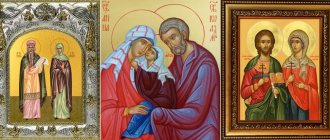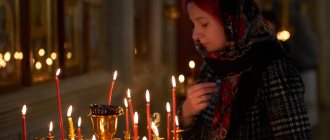Spiritual foundations of the Orthodox family
Hegumen Georgy (Shestun)
The birth of an Orthodox family occurs in the sacrament of marriage. The marriage union of a man and a woman was established by the Creator Himself in paradise after the creation of the first people, whom the Lord created male and female and blessed with the words: “Be fruitful and multiply, and fill the earth and subdue it...” (Gen. 1:28). The Old Testament repeatedly expresses the view of marriage as a matter blessed by God Himself.
Upon His coming to earth, the Lord Jesus Christ not only confirmed the inviolability of marriage, noted in the Law (Lev. 20:10), but also elevated it to the level of a sacrament: “And the Pharisees came to Him and, tempting Him, said to Him: according to all sorts of things, Why is it permissible for a man to divorce his wife? He answered and said to them: Have you not read that He who created in the beginning made them male and female? And he said, “For this reason a man will leave his father and mother and be united to his wife, and the two will become one flesh, so that they are no longer two, but one flesh.” Therefore, what God has joined together, let no man put asunder” (Matthew 19:3-6).
Having gone out into the world to His open service to the human race, He appeared with His Mother and disciples at a wedding feast in Cana of Galilee and performed the first miracle there, turning water into wine, and with His presence sanctified this and all marriage unions concluded by the faithful and those who love God and each other's spouses.
“God himself unites those sanctified by the sacrament and is present in their midst,” says Clement of Alexandria about the holiness of marriage. “It is from You that a wife is matched to a husband,” says the prayer of the betrothal ceremony. And there: “O Lord, send down Your hand and unite.” The Lord sanctifies the combination of spouses in the sacrament of marriage and preserves the incorruptible union of their souls and bodies in mutual love in the image of Christ and the Church.
Holy Christian virginity and the holy sacrament of marriage are the two paths indicated to the faithful in the Word of God (Matt. 19:11-12; 1 Cor. 7:7-10). The Church has always blessed both of these paths and, as is known, condemned those who condemned both. Saint Ignatius the God-Bearer testified to these two paths of pious life already in the 1st century in his letter to Saint Polycarp of Smyrna: “Inspire my sisters to love the Lord and be content with their spouses in the flesh and in the spirit; Likewise, advise my brothers, that in the name of Jesus Christ they should love their spouses, as the Lord loves the Church. And whoever can abide in purity in honor of the Lord’s flesh, let him abide, but without vanity.” The Apostle Paul calls not to listen to false teachers who forbid marriage, who will appear in the last times. Until the end of time, marriages of Orthodox Christians will be celebrated for the glory of God and for the benefit of humanity, and blessed family life will still flourish, for the blessing that is asked for the entire Church is given to the small Church - the Christian family. “God of strength! turn, look down from heaven and behold, and visit these vineyards; guard what Thy right hand has planted, and the branches which Thou hast strengthened for Thyself” (Ps. 79:15-16).
Completing the rite of betrothal, before the mysterious consecration of the marriage by Divine grace begins - the rite of wedding, the priest invites the bride and groom in the face of the entire Church to confirm their free and spontaneous desire to get married, asking: “Do you have a sincere and spontaneous desire and firm intention to be a husband ( wife) of this (this) (name of the bride or groom), whom (whom) you see here in front of you? Isn’t he bound by a promise to another bride (groom)?” How unusual these questions sound for a person with little church, who is accustomed to hearing in the registry office another question that is asked to the bride and groom: “Do you love each other?” Realizing that love is a great sacrament and a grace-filled gift of God, which must be earned through a pure, chaste, sacrificial married life, the Church, through the mouth of the clergy, asks its own special question; it asks a young man and a girl, a man and a woman: “Do you want to live to see love?” with the person standing next to you? Popular wisdom, through the mouths of blessing parents, echoes in its own words: “Peace and love to you!” There will be peace, there will be love. “If you endure it, you will fall in love!”, but if you don’t have patience, you won’t live to see love.
Archpriest Boris Nichiporov writes that at the source, at the beginning of any marriage, lies a meeting. Meeting of a boy and a girl, a man and a woman. A meeting is absolutely not a coincidence, but a providential event in the lives of two people. A meeting is not the first acquaintance, although these two events, meeting and acquaintance, may coincide, and then love at first sight occurs. A meeting is a kind of wound, the birth of a feeling, this is the beginning of a revelation, which we call love. A meeting in its mystical-psychological sense can take place even after many years of acquaintance.
If a marriage is built on the right spiritual foundations, then the moment of meeting as an experience of a constantly renewed feeling is always present for the spouses. Renewal of the feeling of encounter is possible, as a rule, only in God. One church hymn says: Every soul is alive by the Holy Spirit. If this is not the case, then a bad addiction arises between the spouses and the experience of the meeting as an absolutely unique and inimitable event in their lives is smoothed out.
The end of the meeting is marriage. But this sequence is not always followed. Church marriages with blessing very often grant such a meeting after the wedding. And in this the glory of the Church of Christ is revealed!
The Holy Fathers said that in marriage one should try to avoid gross discrepancies in age, education, and external characteristics. But at the same time, no one has ever delved into such subtleties, no one has checked the compatibility parameters. The miracle of marriage also lies in the fact that the Lord often unites the seemingly incompatible. And it turns out that two such people - a man and a woman, a boy and a girl - having married in God, cannot help but love each other. If they do not abandon the path of spiritual self-discovery, then they will definitely love each other more and more.
The mystery and at the same time the core of personality is the image of God in man. The event of recognizing the image of God in a spouse and in a person in general is called revelation. This process is always reciprocal. Revelation and love are identical. There can be no knowledge and revelation in the absence of love. Without love, false knowledge is generated. Revelation can be narrowed or smoothed out altogether if the spouses (or one of the spouses) leave the path of spiritual life. Revelation is a reflection of the eternal. The very act of marriage and God's blessing on marriage have the power of the eternal reunion of spouses in God.
In any happy marriage there is an emotional and sensual antinomy. Spouses always feel a certain inexplicable sadness, and this sadness is about the impending separation at the end of earthly life. In the timeless pledge, the separation has already taken place. It will be in 10 years or in an hour - it doesn’t matter. But this sadness is always bright in God.
And the other pole is the premonition of eternity. It is in this sense that St. John Chrysostom writes that the first Christians had such fullness of revelations and faith that they buried their loved ones in a state of quiet, bright sadness.
Source: educational portal “Slovo”









